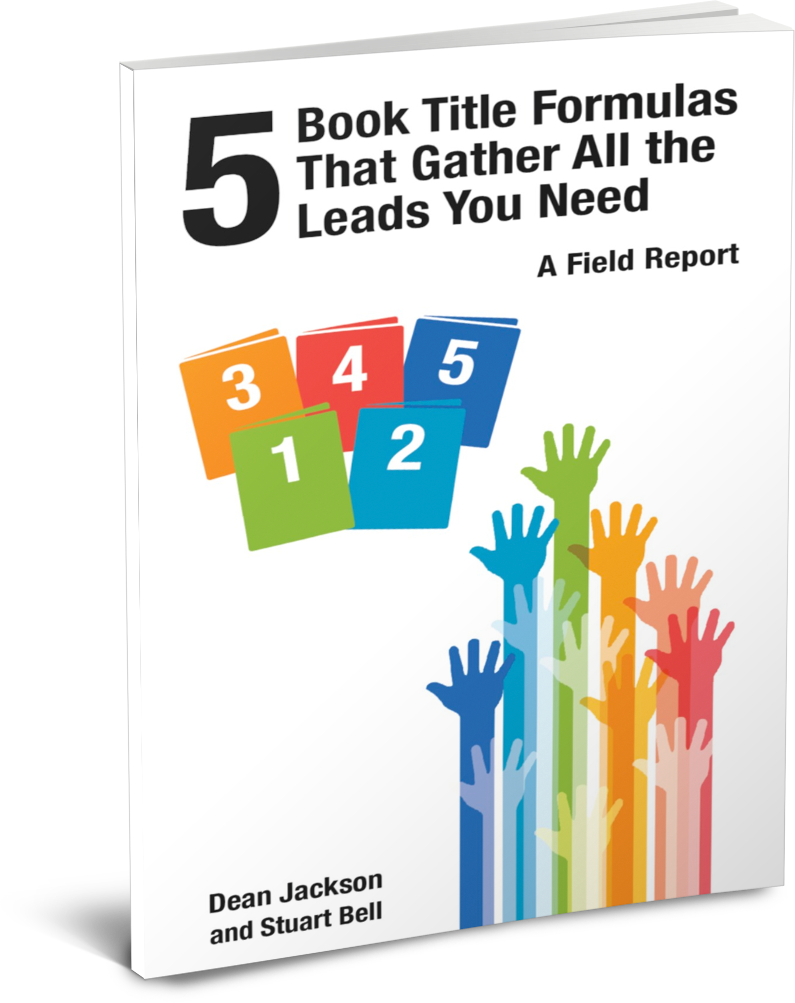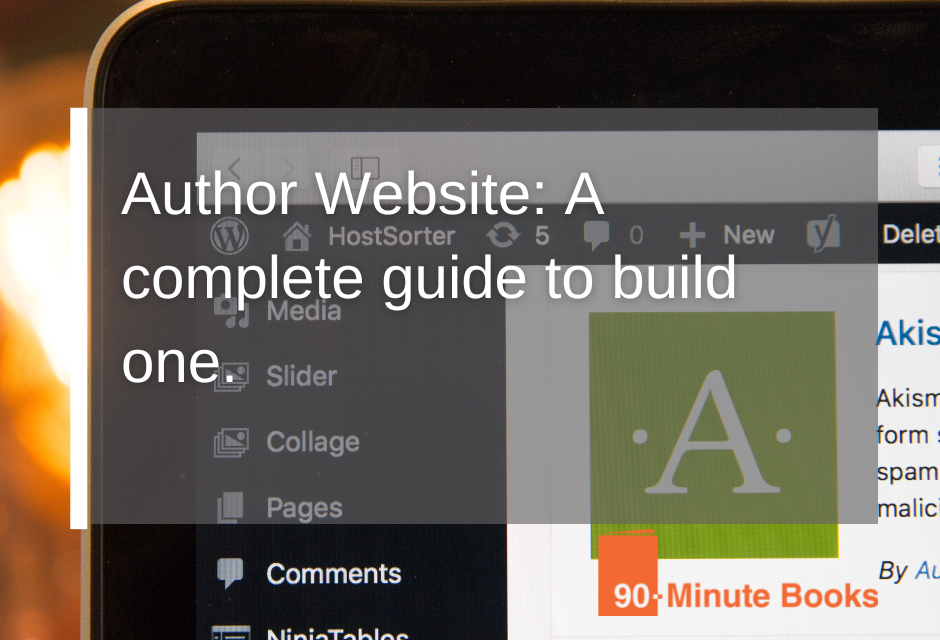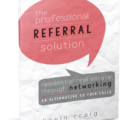Are you an author? published or otherwise? you definitely need a website
Every author needs an author’s website. Period. There is no arguing about that.
no matter how much experience you have, or what anyone else says. Your author website should be a collection of everything you’ve done as an author. In today’s cutthroat environment, having an author website is a must for all writers because of its benefits.
Why Do You Need an Author Website?
First, let’s answer why you would want an author website.
There are many reasons to have an author website, including connecting with future publishers, getting an advantage in your book category, attracting more readers, and using it for book marketing. There are several reasons why you should pay attention to this issue.

FREE BOOK
Discover the 5 Compelling Book Titles Types that create an ‘I Want That…’ response.
1. Build Your Credibility
As an author, you can increase your credibility among readers and fellow authors, which will help you sell more books. What if a prospective publisher couldn’t find evidence that you’re a valuable author online? Not having an author website is a bad sign and will damage your reputation.
A website is the first step to building your reputation as an author. A well-made website from a credible author is a good way to establish your brand as a writer and show your accomplishments in your field. An author brand can help you sell your books more quickly and have a higher conversion rate.
2. Let Your Readers Know More About You
A reader was so impressed with your book that he did a search online to learn more about you. What do you think will Google show him? The following text provides links to third-party websites where you can purchase books, but provides very little extra information about the author.
You wouldn’t want to disappoint your readers by not writing any more books, would you?
An author website is great for fans of your work to find more information about you and your books. An author’s website with information about the author written by the author creates a sense of credibility for the reader.
3. A Platform Completely in Your Control
There is no way to control what another person says about you or your books. An author website gives you the power to share as much information with readers as you want, provides better insights, can be used for marketing your books, and can even include a forum for readers to discuss your books.
The author’s website is customizable, so you can change it however you want, whenever you want. You can keep your readers updated about your upcoming books, answer their queries about your previous books, link your blog to your marketing strategies, and keep them engaged. You can create a website about any topic and post whatever content you want without restrictions.
4. A Place to Direct the Leads
As an author, you might have guest blog posts published on other websites, and have accounts on several forums and social media pages. Which link will be the default one on all these platforms? You cannot keep changing the URL for the buy link of your new book across every platform you have signed up for! It would be very hard, if not scary, and a waste of time.
If you have an author’s website, you can direct anyone to it without hesitation. If anyone asks you where they can find more of your writing, you can tell them the URL to your author’s website. An author’s website is a good place to find information about their books and the author.
How Can You Use the Author Website for Book Marketing?
The main reason why authors want to build their website, have active social media accounts, and go for book signup events is to increase their visibility and reach more readers. All authors have the same goal of increasing book sales. What are the benefits of having an author website for book marketing?
It helps because it is a source of information, and it helps because it is a source of support. The author’s website helps in multiple ways; it provides information and support to the reader. Author websites can be used to increase sales in many ways. The success of your book marketing campaign depends on your creativity. Here are some ways to get started that are simple.
1. Build a Mailing List
Wouldn’t it be nice to have the ability to contact the individuals who enjoy your previous work and request that they take a look at your next book?
That’s basically what a mailing list does. You can collect email addresses from visitors to your author’s website by asking them to sign up for your newsletter. The people who sign up for your mailing list obviously like what they see on your website and would want to hear more from you! This is your secret marketing tool to promote your books, announce any offers, or request them to write reviews.
2. Grab Those Leads
An author’s website is a space where you can promote your book without worrying about safety. The people who visit your site may already be your fans, or they may be curious about your work. If you want to close the deal or turn them into warm leads, add convincing details about your book with a secure buy link.
You could use an in-website buy option, free sample books, or sample chapter reads as alternatives. Be sure to turn interested people into leads, which will eventually turn into sales.
3. Flaunt Your Expertise
If you are a non-fiction writer, it is especially important to show off your knowledge of a particular subject. You can blog about your book on your author’s website. Although you may primarily write fiction, having a few blogs that tie in with your work can be beneficial.
You can include information about any awards you have won, the events you have attended, and any seminars you have taken. You can add anything to your author’s website that will make you look like a respected author in your genre. This can increase book sales and work as a form of indirect marketing. Try showing off your expertise if you want to get mentioned on third-party websites and help with book marketing.
Steps to take before you build your author website
1. CHOOSE YOUR CONTENT MANAGEMENT SYSTEM (CMS)
I use and recommend WordPress. You can easily change this software to suit your needs, and since it is open source, many plugins can give your site any kind of functionality you want.
Although WordPress can be intimidating to some people, others find it a preferable platform to work with compared to SquareSpace. Before making a decision, think about how comfortable you would feel using and updating the thing you’re considering. You should update your website regularly, and it shouldn’t cost you every time you want to make a small change. I train my clients on how to post their blogs to WordPress and make minor site updates. This way, they don’t feel completely dependent on me.
2. PICK A THEME
A website theme is like a foundation for your website. It provides a basic structure to build upon. A well-designed professional theme can be purchased for approximately $50. For a little additional cost, you can usually get limited-term support from the theme developer. The support is normally worth the money, especially if you don’t know much about web development. It is important to read reviews of both the theme and the support before deciding. You don’t want a product that is difficult to use or an unresponsive support team.
If you’re new to web development, you may want to use a free theme to get started. To find free themes, go to the WordPress dashboard and select Appearance. With a free theme, you won’t have as many options, but it’ll be simpler to update. You can always change to a more robust theme later on.
The back end of your WordPress site will look different depending on the theme you choose, as every WordPress developer has their own way of doing things. Most themes come with documentation that will help you get started.
Also, don’t panic when you hear the word theme! You can make your website stand out from the rest, even if you customize it. Creating a beautiful and unique website can be accomplished by using your own photography and design elements. For example, I built an author website and a life coaching website using the Jevelin theme, and they both look completely different.
Finally, make sure the theme you choose is fully mobile responsive. This should really be a given nowadays. This means that more than half of web browsing happens on mobile devices, so it is important to have a website that provides a good mobile experience. The design of your website should be such that it can be easily accessed on mobile devices if you want people to be able to find you through organic search. This will help you rank higher on Google.
3. BUY YOUR DOMAIN NAME
You should try to buy your name (or the name you publish under) if you can. Domain names are typically around $12 per year. If someone else owns the domain you want, you may have to pay more to get it from them.
Using the title of your book as your domain name is not advisable. Why? This suggests that you will write more books in the future and that building a separate website for each book would be undesirable. As an author, your name is your brand, so try to use a variation of it as your domain name.
Make sure you like your domain name. It’s best to choose your domain name carefully from the beginning, as it can be difficult to change it later without losing traffic to your site.
4. SET UP YOUR HOSTING
You must pay a hosting provider to host your website on their servers. I recommend BlueHost, as they provide a free SSL certificate. However, there are other hosting service providers available. The amount you will pay for website hosting each month will depend on the type of hosting you select and the length of the contract you sign. Generally, you can expect to pay $5 to $12 monthly.
If your hosting plan comes with a staging environment, you can work on your website without making it available to the general public. This can be helpful if you want to ensure your website is ready before making it live. If you’re planning on making changes to your website in the future, a staging environment can be a great way to test those changes before making them live. That way, you can ensure everything is working how you want it to before your visitors see the new version of your site.
5. DETERMINE YOUR GOALS
Figure out your why. Why are you building a website? Perhaps you would prefer an online presence where you can exercise more control over the content and user experience. If you want to keep your readers engaged, you might consider providing them exclusive content and freebies. A blog could be a good way to share information that expands on what is in your book. You might want to create your own website for several reasons, including having more control over the design and content, customizing it to suit your needs, and saving money on hosting fees.
Although many businesses have websites, you shouldn’t get one just because everyone else has one. Instead, consider whether a website would help you achieve your business goals. Building a website you never use or don’t keep up to date could hurt your reputation more than help it. If people believe you have stopped writing, they will be less likely to subscribe to your newsletter or follow you on social media.
Your why may change over time, and that’s fine. having your own website should help you achieve your goals while providing a good user experience.
In conclusion,
setting up your website is a crucial step as an author. follow these tips and take that step today!
Guest Post Disclaimer
The views expressed in this post do not represent the views of 90-Minute Books. The information has not been verified and should be considered an opinion. You are always advised to do independent research.











